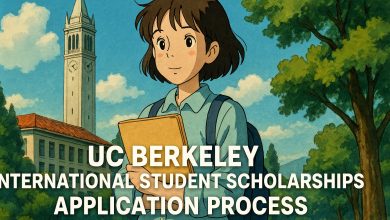How to Request for your GCMS Note for Free
One of the hardest things for applicants is the waiting period following the submission of their application. Well, this shouldn’t be a problem, kindly acquire updates on the status of your application by requesting Global Case Management System (GCMS) notes.
Before, acquiring GCMS notes was a privilege for citizens or permanent residents within Canada, but over the years, the Canadian government has made it easy for anyone anywhere in the world to request it through authorized channels and get it in no time.
Ordering GCMS notes is a straightforward process but a long one that requires patience and accuracy.
In this guide, you’ll learn how to request your GCMS notes for free so that you can trace the status of your visa and use the information for reapplication or just for the possession of it.
What are GCMS Notes
GCMS notes are official documents kept by Immigration, Refugees, and Citizenship Canada (IRCC) that are essential in the immigration application process.
These notes contain detailed information about your application, including application processing data, immigration officer assessments, and other important information kept in IRCC’s Global Case Management System.
How to Request for your GCMS Note for Free
Here is a step-by-step process of how to request GCMS notes.
Keep abreast that the channels through which you’ll be requesting are free but you’ll be required to pay a fee of $5 by the Canadian government.
Let’s begin;
#1. You Must Be Eligible for the GCMS Notes
To qualify for GCMS notes, you must have applied to IRCC and/or the Canadian Border Services Agency (CBSA), this way you are said to have completed the R-10 completion stage request.
This stage checks whether or not all of the required papers stated in the application checklist have been included.
To receive the GCMS notes, a corporation headquartered in Canada may submit an Access to Information and Privacy (ATIP) request.
While you can technically obtain GCMS notes at any point during the waiting process, it is generally preferable to wait until more detailed notes are available.
It is best to wait until after the R-10 completeness check to get a clearer sense of your application’s development.
#2. Start Gathering Required Documents
Requesting for GCMS notes may require a series of forms and documents, so gather all of the required information before submitting your request.
The required pieces of information are:
- Full name
- Date of Birth
- Address
- Application Number
- Unique Client Identifier (UCI) and any other relevant identification numbers provided by IRCC during the application process.
#3. Requesting for GCMS notes
Based on your region, you have two options for submitting your GCMS note request. If you live in Canada, you can submit an ATIP request to IRCC directly.
Follow these steps to order for GCMS notes if you’re requesting from outside Canada:
- Visit the ATIP website
- Scroll downwards, check out the terms and conditions box and continue.
- Select the Department where you would like to submit an Access to Information or Privacy request”
- Select “Canada Border Services Agency”
- Select the “foreign national outside Canada” option on the next field.
You’ll have to fill out the entire 15 fields because it’s compulsory, please correct the information.
- Choose yes or no if you’re requesting the information for yourself or a friend.
- Go for an electronic copy because you’re outside Canada.
- Make sure to fill up everything then Click on the requested information.
It is recommended that applicants from outside of Canada engage the services of a reputable immigration adviser or lawyer to manage the application on their behalf.
Through formal IRCC channels, the request can be made online or by mail.
PS: An ATIP request, which includes the request for GCMS notes, costs $5.
If you are sending the request by mail, include a check or money order for the fee amount with the application.
#4. Wait for a Response from IRCC
After submitting your request and payment, you must wait for a response from IRCC.
It may take a long time to reply, but won’t be more than a month, because IRCC is required by Canadian law to respond within 30 days of a request.
If there is no response within this timeframe, contact the IRCC ATIP division via mail or website.
#5. Make Sure to Analyze the Information to Meet your Needs
It is your responsibility to go over the information on the GCMS notes and make sure it has correct details and updates, because sometimes; although scarce – the officers at IRCC may make mistakes at some point.
Any observations, evaluations, or decisions made by immigration officials, as well as information about the officers themselves, should be closely scrutinized.
The information contained in GCMS notes provides important insights into the state and development of your application, assisting you in identifying potential difficulties or areas that require attention.
You need to know where on the officer’s note where to Locate and get your GCMS. The ATIP request for GCMS officer’s notes comes in hundreds of pages and you’ll find your visa application letter updated on the few last pages.
Where to Submit the GCMS Notes Request
You can submit the GCMS notes either in person or via mail. Submitting in person is possible when you’re staying in Canada while electric submission is for folks outside Canada.
Submit the GCMS notes via the ATIP online request tool. Kindly refer to requesting GCMS notes for step by step guide – the guides involve a series of questions to be answered, once the fields are filled up accurately, you can submit your request with a click.
electronic portal of submitting the two ways you can submit the GCMS notes either submitting a request electronically, you must do so through the ATIP Online Request tool. Your request will be sent to the ATIP decision once you’re done.
You are to fill out any of the following forms to submit the GCMS notes request in person:
- The Access to Information and Personal Information Form (IMM 5563) under Immigration, Refugees and Citizenship Canada (IRCC)
- Form (TBC/CTC 350-57): The Treasury Board of Canada Secretariat’s Access to Information Request form.
- Form (TBC/CTC 350-58): The Treasury Board of Canada Secretariat’s Personal Information Request form
Before submitting a letter, indicate the act under which the request is made and make available enough details that will enable IRCC to recognise and honour the request.
Having a Hard Time? Seek Professional Help
If you come across complicated information or have questions regarding the content of your GCMS notes, it is best to obtain professional help from an immigration counsellor or lawyer.
If your visa application was denied unfairly and you’re convinced that it was a result of mistakes from the IRCC office, you can file an appeal through immigration lawyers.
They know to correctly analyze the notes and advise you on your future moves.
Professional Visa Solutions, which has many years of experience in the Canadian immigration field, will help you with any additional information requests regarding your submitted application.
Keep in mind that there’s no legal ground that provides for an appeal of a temporary resident visa application rejection by the IRCC.
However, you have the right only to reapply for the same visa application. That’s when you’ll need expert help.
What Are the Benefits of Getting GCMS Notes?
The benefits of the GCMS notes can’t be overstated because it serves as a mirror to your visa application letter health and a checklist of what to include and what not to when reapplying.
It’s an irreplaceable tool for decision-making during visa reapplication. Here are some reasons why you should request for GCMS notes:
#1. It States Clear Reasons for Rejection
The GCMS notes will assist you in clarifying and comprehending the reasons for your visa application refusal. This is quite helpful when reapplying for a specific visa program because it allows you to prevent first mistakes.
#2. Accurate Information on the Status of Your Application
If your application is taking longer than usual to process, requesting GCMS notes is a useful way to check on its status.
The notes from GCMS will reveal which immigration department is currently processing your case. Sometimes, the decision was delayed for whatever reason but with the GCMS notes you know your stand.
#3. Obtaining Paper Copies of Documents
If you request materials submitted at the time of application together with your GCMS comments, you will receive all of the documentation you require when reapplying for the visa program. However, these benefits are peculiar to residents within Canada.
When Should I Order GCMS Notes
You can obtain GCMS notes for Canadian permanent residency applications as soon as the R10 completeness check stage is reached.
This is Regulation 10 of the Immigration and Refugee Protection Act, and it is the stage of your application’s processing where IRCC ensures that all information and documentation is complete.
This stage is typically completed within one month of applying to IRCC.
The best time to order GCMS notes for PR applications is roughly two to three months after applying.
You may order GCMS notes at this time if you are seeking temporary residence or if your permanent residence has been processed and a decision has been reached by IRCC.
If your applications for temporary or permanent residence are denied, the reason(s) will be included in your GCMS notes.
It Does Not Take More than 30 Days to Get a Reply
The IRCC is required by the Canadian Access to Information and Privacy Act to reply to a request for GCMS notes within 30 days.
However, after accounting for the workload in each office and the number of pending petitions, the average processing time is 40 days.
Ordering GCMS notes will not affect or delay your file or visa application process.
FAQs
#1. How can I get my GCMS notes more quickly?
If you have authorized a person to act on your behalf, such as an immigration counsellor or lawyer, you can provide their contact information in your ATIP request. This may speed up the delivery of your GCMS notes to your representative, who may then share them with you.
#2. How long does it take the IRCC to respond to GCMS requests?
This has been discussed in this article, however, the Access to Information and Privacy Act requires the IRCC to reply to GCMS requests for information within 30 days.
Considering the typical processing time, the pressure on different departments, and the number of pending requests, it is normal for the IRCC to take up to 40 days to respond to these requests.
Requesting GCMS remarks will have no bearing on your visa application.
#3. When Is It Appropriate to Request GCMS Notes?
For Canadian permanent resident applications, there is an R10 completeness check stage. The Immigration and Refugee Protection Act (IRPA) Regulation 10 (R10) stage is a level of application processing at which all documentation and information is complete.
This level is reached within one month after applying to the IRCC. The ideal time to request GCMS remarks for your permanent residency application will be two or three months after this stage is completed.
You can also request GCMS notes if the IRCC has issued a decision on your temporary or permanent residence application.
If your application was denied for whatever reason, the GCMS notes will give specific reasons for rejection.
Conclusion
As a student, if you applied for numerous scholarships in different countries and you aren’t sure of the results, requesting GCMS notes might be a useful approach to getting status updates on your Canadian immigration application.
This article highlights how to request your GCMS notes for free, but keep in mind that you have to pay the processing fee.
You can navigate the process successfully, obtain important information, and receive insights on the progress of your application by following the step-by-step guide given in this blog article.
Remember to review your notes thoroughly and, if necessary, seek expert help. It may be a waste of time trying to appeal a visa rejection, rather than reapply but this time, seek professional help.



